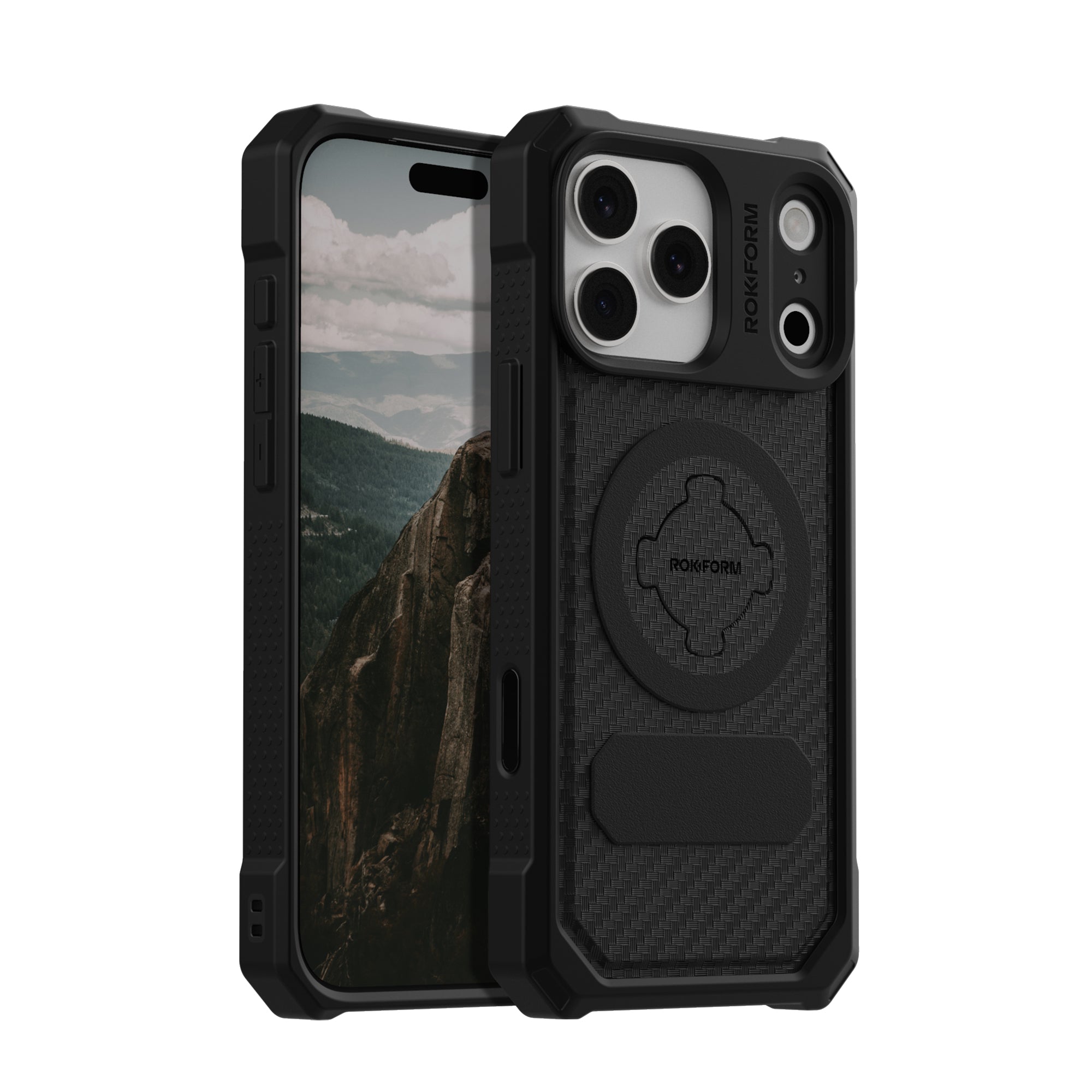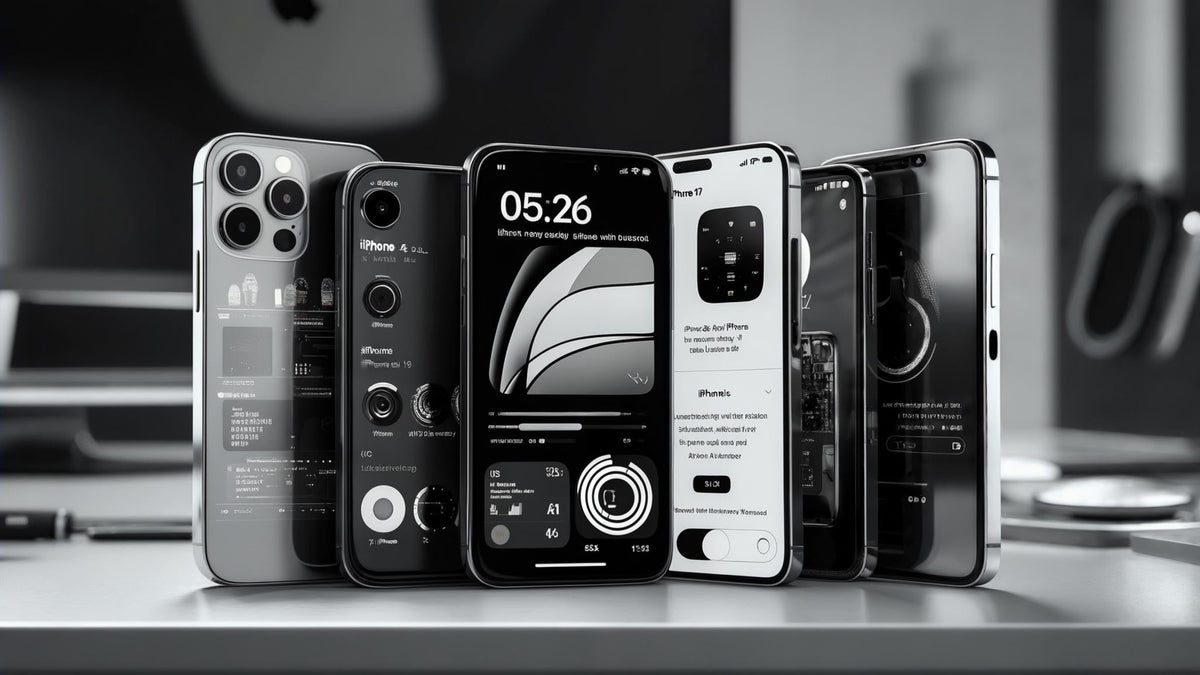Ever stared at your phone wondering "Wait, which pixel do i have?" You're definitely not alone. Google doesn't exactly make it obvious – there's usually no model name stamped on the back, and honestly, they all start to look pretty similar after a while.
I learned this the hard way when my Pixel took an unexpected swim during a camping trip. Suddenly I'm sitting there with a dead phone, trying to file an insurance claim, and I have no clue if I owned a Pixel 5 or 6. According to TechResolvers, this frustrating reality affects tons of people since Google Pixel phones often don't have identifying text on the case. Turns out there are actually 25+ ways to figure this out – whether your phone is working perfectly or completely dead.
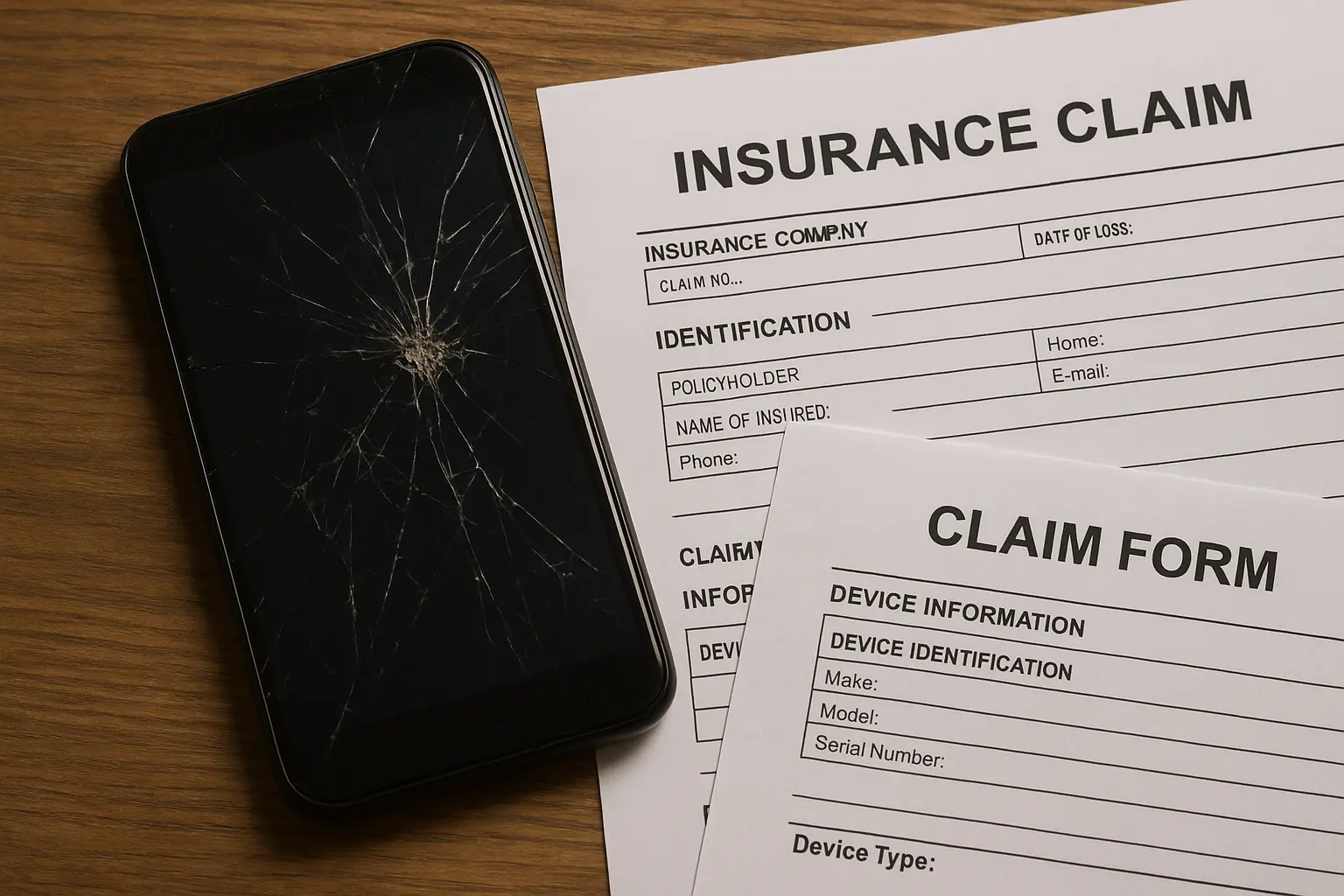
Why This Actually Matters
Look, I get it – this might seem like a "nice to know" thing. But getting your pixel phone model wrong can cost you real money:
Accessories: Ever bought a $50 case online only to find out the camera holes don't line up? Yeah, that's a fun surprise.
Repairs: Different models need different parts and expertise
Trade-ins: Misidentify a Pixel 6 Pro as a regular 6 and you could lose hundreds in trade value
Insurance claims: Good luck getting paid out if you can't prove what you actually owned
Accessory compatibility becomes a costly mistake when you guess wrong. Phone cases, screen protectors, and mounting systems are engineered for specific dimensions and port placements. A Pixel 6's camera bar design requires completely different case engineering than a Pixel 5's traditional camera bump.
When selecting protective accessories for outdoor adventures, understanding your exact model ensures compatibility with specialized rugged protection systems designed for demanding conditions.
Consider Sarah, who assumed her device was a standard Pixel 6 and ordered a $60 rugged case online. When it arrived, the camera cutouts didn't align properly because she actually owned a Pixel 6 Pro with different camera positioning. The return shipping and restocking fees cost her an additional $15, plus two weeks without proper protection.
The Easy Ways (If Your Phone Works)
1. Settings Menu Deep Dive
This is your best bet for google pixel identification. Navigate to Settings > About Phone > Regulatory Labels for instant model identification. This method accesses your device's internal database, providing the most accurate information available. You'll see your exact model number, Android version, and additional specifications that eliminate any guesswork.
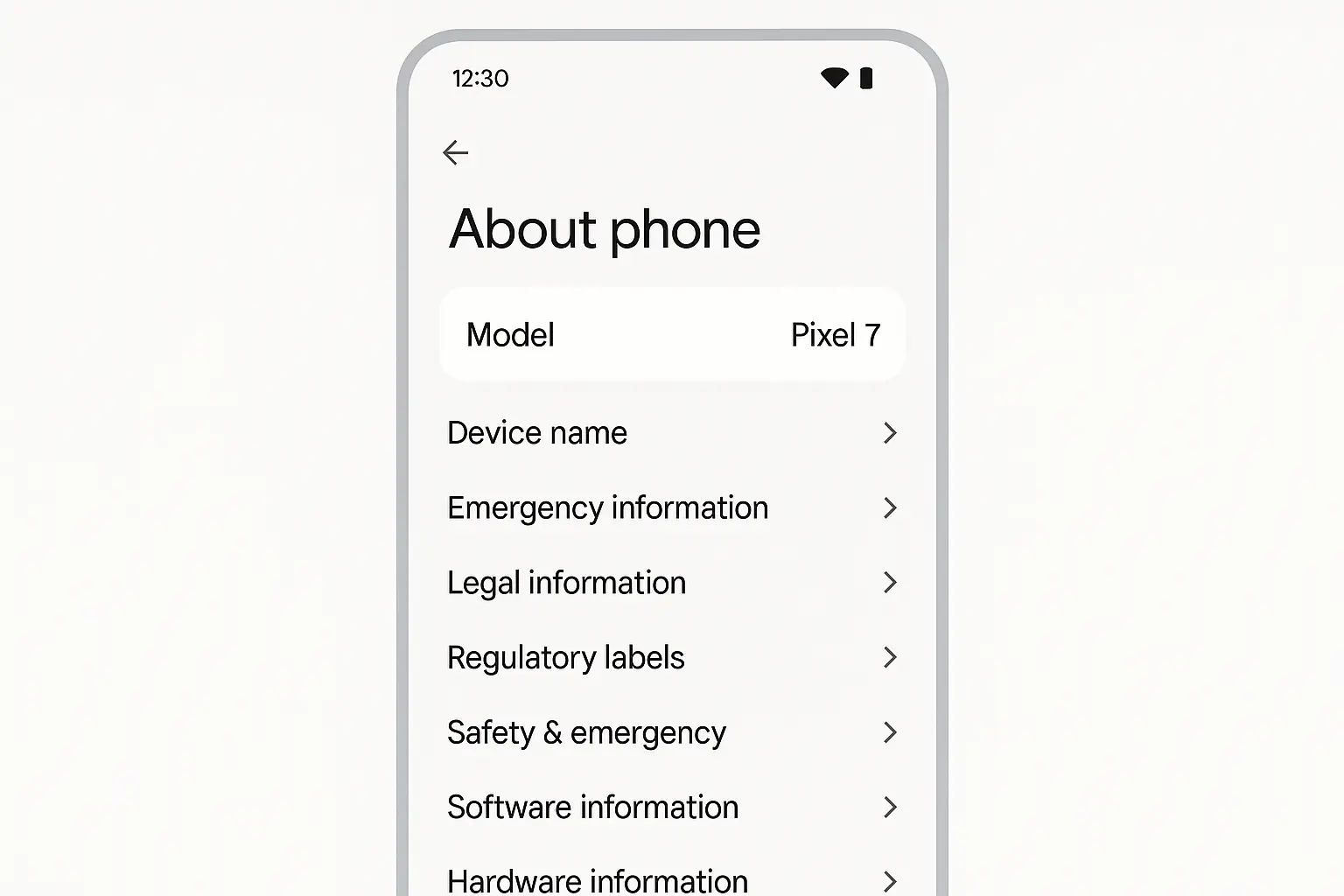
The regulatory labels section contains legally required device information that manufacturers must include. This data remains consistent across all regions and carrier variants, making it universally reliable regardless of where you purchased your Pixel.
2. IMEI Lookup Verification
Dial *#06# to display your IMEI instantly. This brings up your phone's 15-digit fingerprint that connects directly to manufacturer databases containing complete device specifications. Copy that number and throw it into Google's official device checker or any reputable IMEI lookup site for comprehensive model information.
Mike's Pixel 5 suffered water damage during a kayaking trip and wouldn't power on. By accessing his carrier account online, he retrieved the IMEI from his device history. The IMEI lookup confirmed his exact device model for the insurance claim, even though the phone was completely non-functional.
3. Check Your Google Account
Head to myaccount.google.com and navigate to your device management section. Google maintains a comprehensive list of all devices associated with your account, including model names, registration dates, and last activity timestamps.
This method proves especially valuable when you've owned multiple Pixel devices or need to verify information for devices no longer in your possession. The historical data helps distinguish between similar models based on purchase timelines.
4. Developer Options Analysis
Enable Developer Options by tapping Build Number seven times in Settings > About Phone. Once activated, navigate to the "Model & Hardware" section for detailed specifications including hardware revision numbers and build information.
Developer Options reveal technical details not visible in standard settings menus. This information helps identify specific variants, regional differences, and carrier customizations that might affect compatibility or features.
5. System Update Information
Access Settings > System > System Update to view your current Android version and security patch level. Different Pixel models support different Android versions, and this information helps narrow down your device generation.
Build numbers contain encoded information about your device's manufacturing date, regional variant, and carrier customization. Cross-referencing this data with official Google documentation provides additional confirmation of your model identification.
When You Need to Play Detective (Physical Clues)
6. Camera Module Evolution - The Biggest Tell
This is probably the easiest visual check for pixel phone model identification:
Pixel 1-5: Traditional camera bump (round or square housing) positioned in the upper portion of the device back. These older models feature more compact camera modules that don't dominate the device design.
Pixel 6-8: That distinctive horizontal camera bar that spans the entire device width, creating an unmistakable visual signature. The rectangular bar design became Google's signature look starting with the Pixel 6 series.
Pixel 9+: Similar horizontal orientation but with rounded, oval edges that soften the overall appearance while maintaining the full-width design.
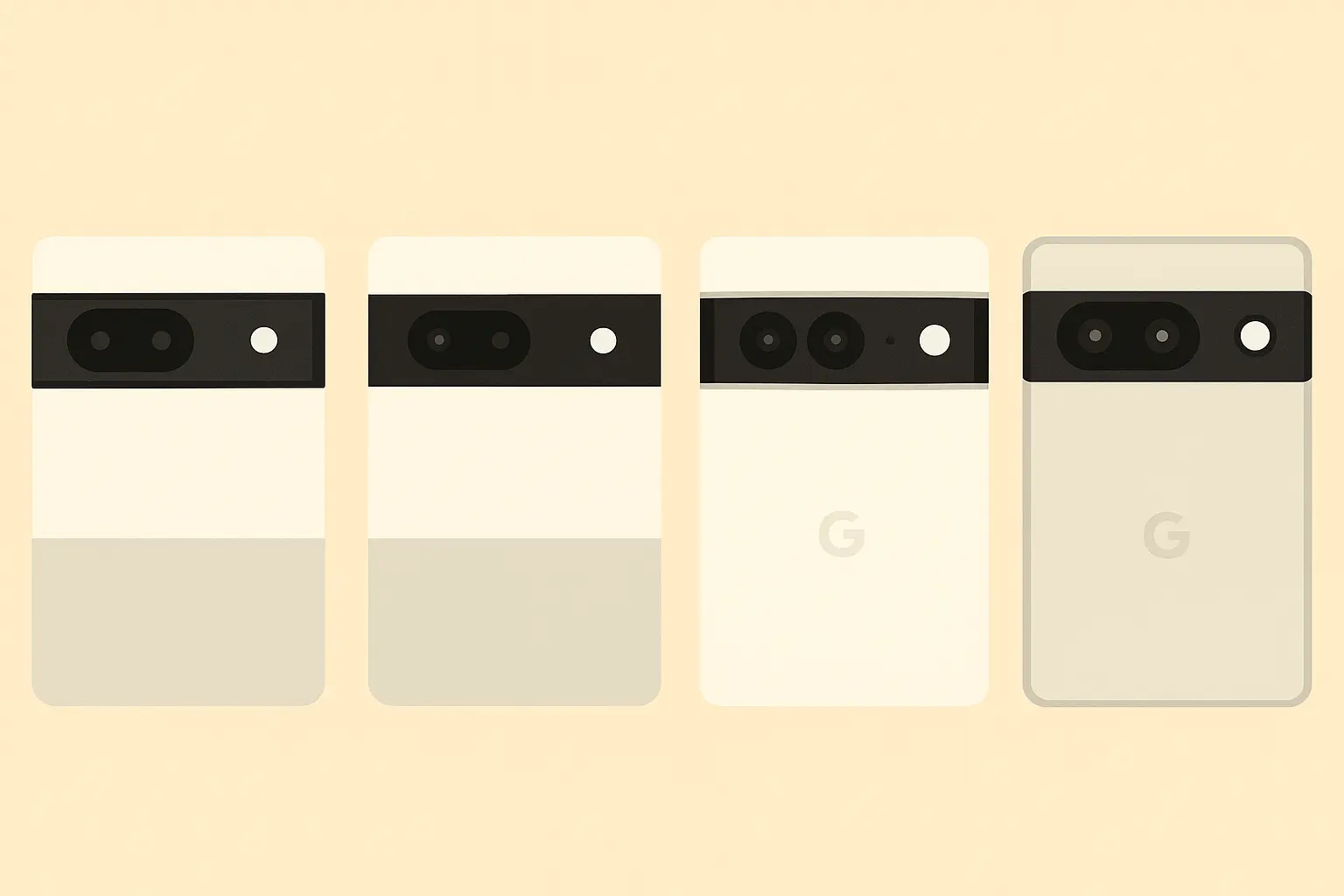
Camera lens count also varies between models. Standard Pixel devices typically feature dual camera systems, while Pro models include triple camera arrays with additional telephoto or ultrawide lenses.
7. Fingerprint Sensor Placement
Pixel 1-5: Round fingerprint sensor on the back, positioned below the camera module. This physical sensor provides tactile feedback and remains visible as a distinct circular element on the device back.
Pixel 6+: No physical rear sensor – it's built into the screen using under-display fingerprint technology. If you can't find a physical fingerprint sensor on your device's back, you're likely holding a Pixel 6 or newer model.
8. Screen Design Evolution
Pixel 1-2: Big chunky bezels top and bottom with traditional rectangular screens. These bezels house front-facing speakers and sensors, creating a distinctive appearance that immediately identifies older Pixel models.
Pixel 3: That controversial notch everyone complained about. This design element appeared only on Pixel 3 models, making it a definitive identifier for that generation.
Pixel 4+: Small hole-punch camera with minimal bezels. The small circular cutout for the front camera creates a more modern appearance while maximizing screen real estate.
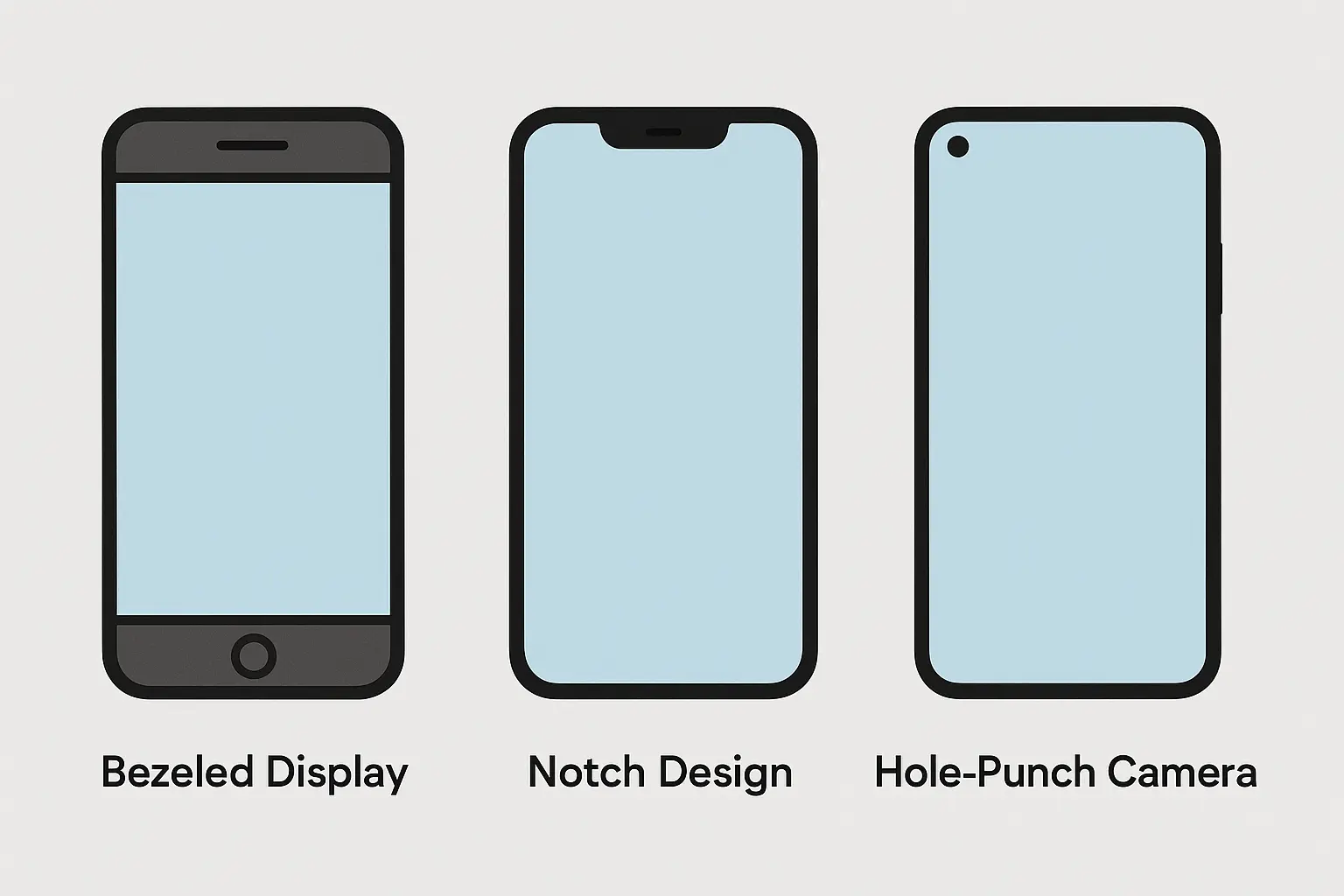
9. Build Materials Assessment
Pixel 1 and 2 models combine glass panels with aluminum frames, creating a premium feel with distinctive material transitions. The glass back panels enable wireless charging on compatible models while providing a smooth, reflective surface.
Pixel 3-5 models maintained glass back construction with aluminum frames but refined the integration between materials. The seamless transitions between glass and metal create a more unified appearance compared to earlier models.
Pixel 6 and newer models incorporate recycled materials while maintaining premium construction quality. The environmental focus doesn't compromise build quality but may create subtle texture differences compared to traditional materials.
Feature Detective Work
Some features only showed up on certain models, making them reliable indicators for google pixel identification:
10. Face Unlock Capability
Face Unlock: Pixel 4 or newer. Face Unlock technology debuted with the Pixel 4, making it a clear dividing line between older and newer models. If your device supports Face Unlock, you can immediately eliminate Pixel 1-3 models from consideration.
11. Wireless Charging Test
Wireless charging: Pixel 3 and up (except the "a" series). Place your device on a wireless charging pad to test compatibility. Pixel 3 and newer models (excluding 3a/4a series) support Qi wireless charging, while earlier models require wired charging exclusively.
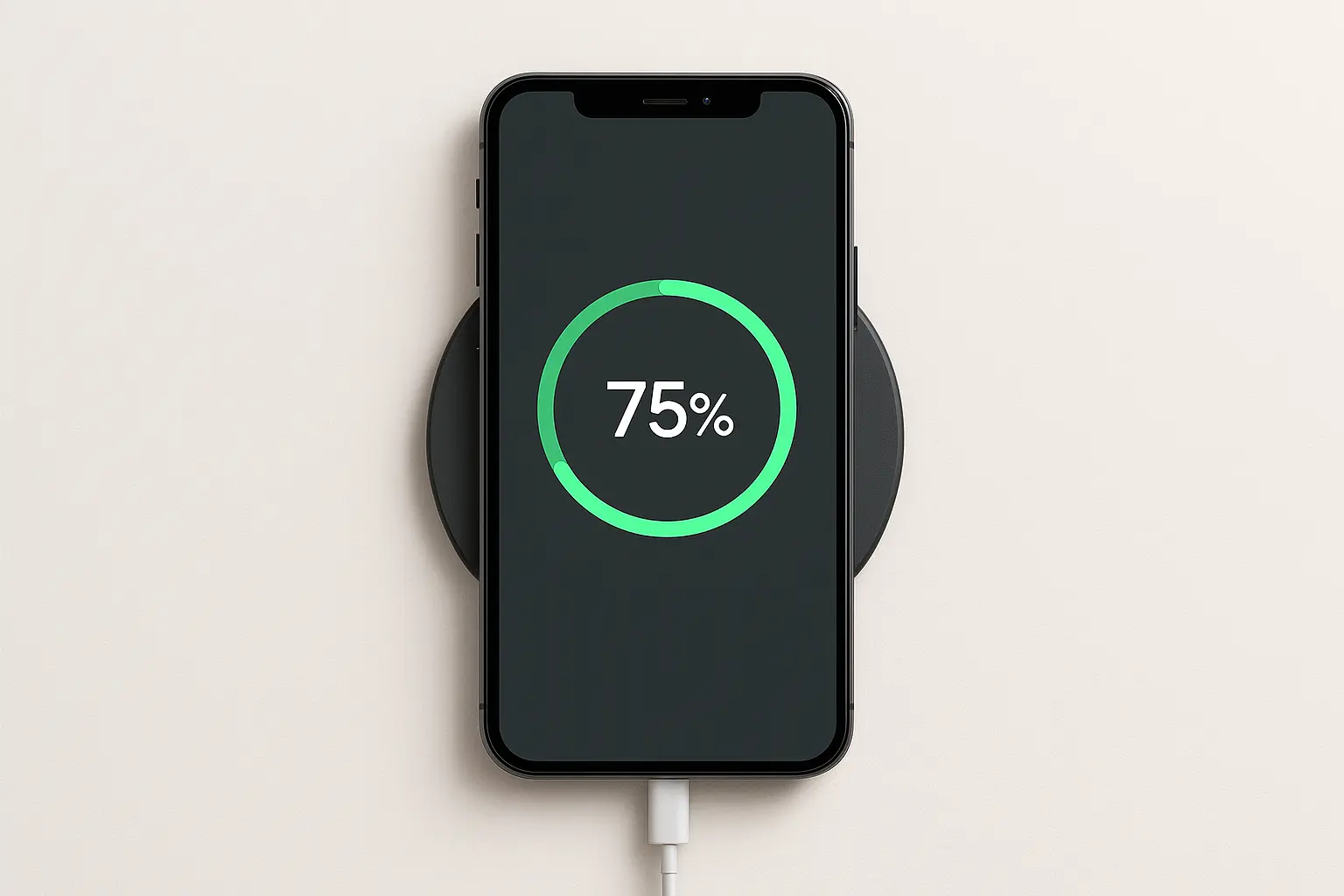
The 3a and 4a series deliberately omitted wireless charging to achieve lower price points, making this feature a reliable way to distinguish between standard and "a" series models within the same generation.
For users who rely on wireless charging during their daily routines, understanding which models support this feature becomes crucial when selecting compatible wireless charging solutions for home and office use.
12. Network and Modern Features
5G: Pixel 4a 5G, Pixel 5, or newer. 5G support began with the Pixel 4a 5G and became standard on Pixel 5 and all subsequent models. If your device connects to 5G networks, you can eliminate Pixel 1-4 (standard) models from consideration.
Magic Eraser in camera: Pixel 6 or newer. Magic Eraser debuted as a native camera feature with the Pixel 6 series, leveraging Google's Tensor chip for on-device AI processing. If your camera app includes Magic Eraser functionality, you're using a Pixel 6 or newer model.
Headphone jack: Only on Pixel 3a and 4a (Google's budget phones). Most Pixel models eliminated the headphone jack to achieve thinner designs and improve water resistance. However, the Pixel 3a and 4a series retained the 3.5mm jack as a user-friendly feature for budget-conscious buyers.
13. Advanced AI Features
Live Translate: Pixel 6+ models. Live Translate provides real-time translation for conversations, camera text, and various content types using on-device AI processing. This feature requires the Tensor chip introduced with Pixel 6 models.
Car Crash Detection: Pixel 4+ models. Car Crash Detection uses your device's sensors to identify potential vehicle accidents and automatically contact emergency services if you don't respond to prompts. This feature requires Pixel 4 or newer hardware capabilities.
Hold for Me: Pixel 3+ models. Hold for Me leverages Google Assistant to monitor phone calls while you're placed on hold, alerting you when a human representative joins the call. This feature requires Pixel 3 or newer hardware and Google Assistant integration.
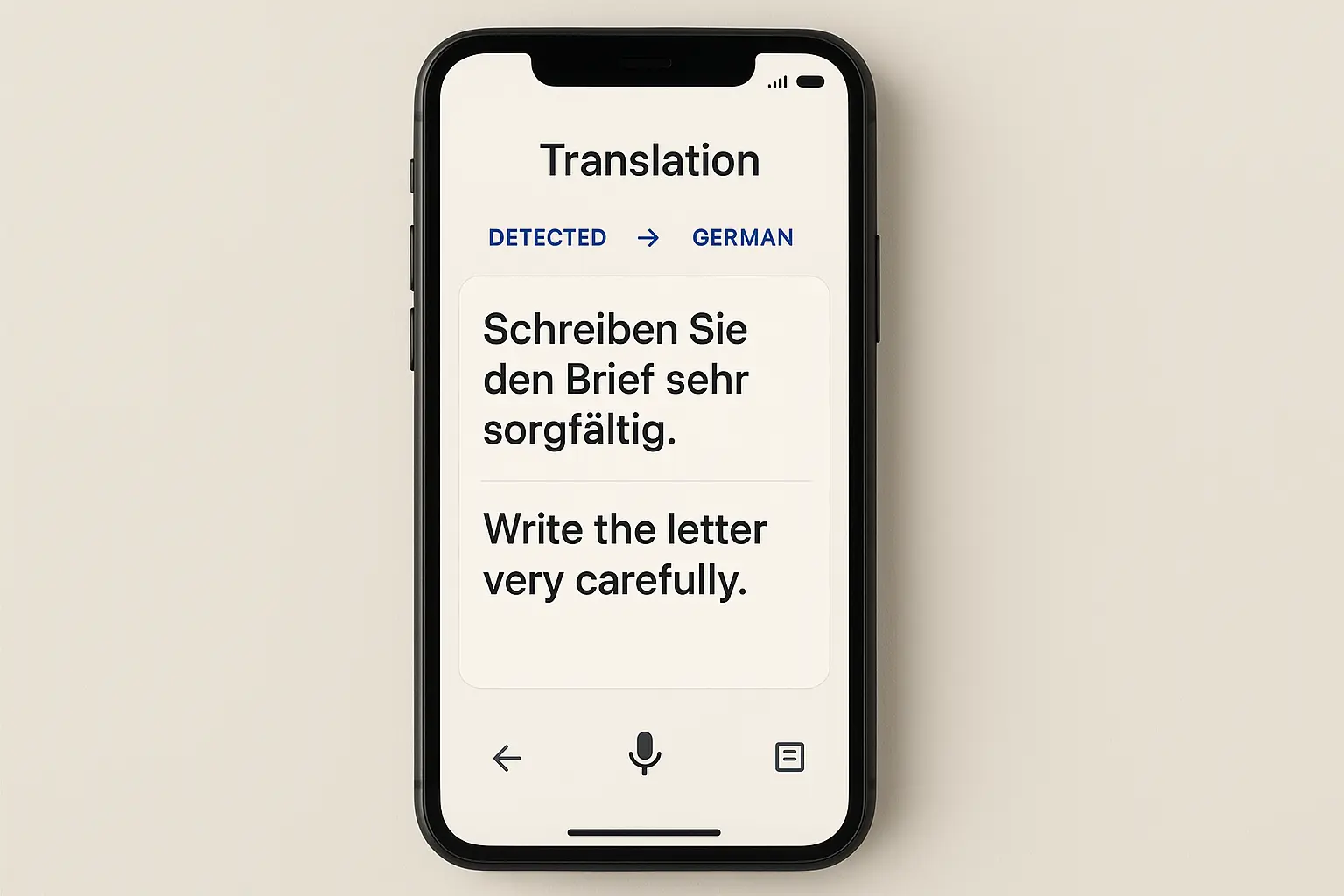
Feature |
Pixel 1-3 |
Pixel 3a/4a |
Pixel 4-5 |
Pixel 6+ |
|---|---|---|---|---|
Wireless Charging |
Pixel 3 only |
No |
Yes |
Yes |
5G Support |
No |
4a 5G only |
Pixel 5 only |
All models |
Face Unlock |
Pixel 4 only |
No |
Yes |
Yes |
Headphone Jack |
No |
Yes |
No |
No |
Under-display Fingerprint |
No |
No |
No |
Yes |
Magic Eraser |
No |
No |
No |
Yes |
External Verification Methods
14. Check Your Original Box
If you still have the packaging (and let's be honest, who doesn't keep phone boxes "just in case"?), it's a goldmine of info for pixel phone model identification. The model number, storage size, and color are printed right on the outside. Plus, your IMEI and serial number are usually on a sticker inside.
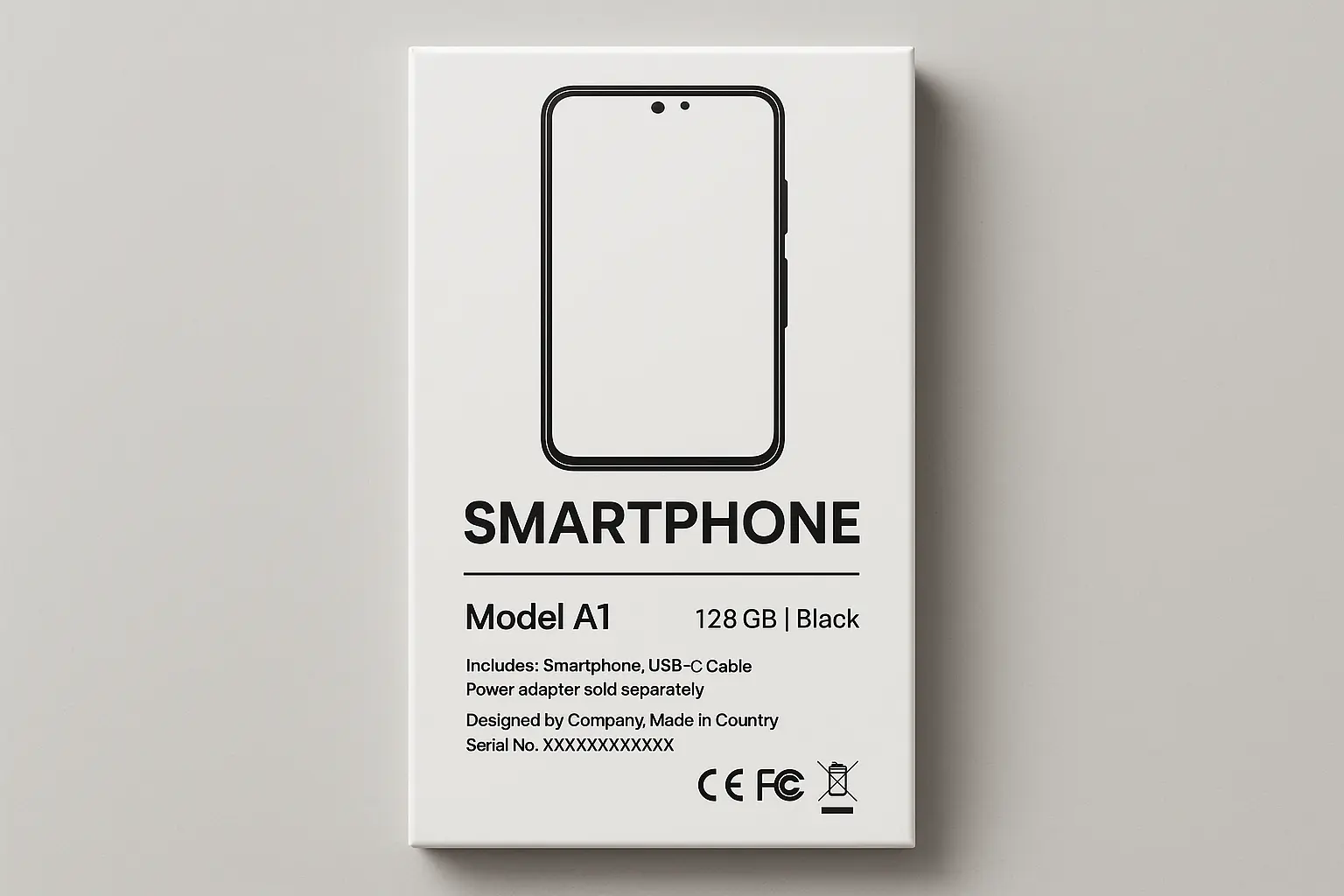
Packaging also includes the device's IMEI number, serial number, and manufacturing information. This data provides backup identification when your device is damaged or when you need verification for warranty or insurance claims.
15. Receipt Archaeology
Time to dig through those emails for google pixel identification. Your purchase confirmation usually has way more detail than you remember - exact model name, storage capacity, color, everything. Even if you bought it in-store, check your email for digital receipts.
Review your purchase receipt, carrier account, or email confirmations for specific model information. Retailers and carriers typically include detailed device specifications in purchase documentation and account records.
Jessica needed to identify her damaged Pixel for a warranty repair, but the device wouldn't power on. She found her original email receipt from Google Store, which clearly listed "Pixel 7 Pro, 256GB, Snow" along with the serial number. This information allowed the repair center to process her warranty claim without needing to examine the damaged device.
16. SIM Tray Detective Work
Pop out your SIM tray with that little tool you definitely didn't lose. Sometimes there are tiny model numbers or codes printed on the tray itself or visible in the slot. It's a long shot, but worth a look.
Remove your SIM tray using the ejector tool and examine both the tray and the slot for any printed model information or identifying marks. Some manufacturers include model numbers or production codes in these locations.
17. Carrier Account Check
Log into your carrier's website or app and navigate to device management sections. Carriers maintain comprehensive records of all devices connected to your account, including model names, IMEI numbers, and activation dates.
Contact customer service if online account access doesn't provide sufficient detail. Representatives can access detailed device information using your phone number or account information, providing official verification of your device model.
Third-Party Tools and Professional Help
18. Device Info Apps
If your phone's working, apps like "Device Info HW" or "AIDA64" will tell you absolutely everything about your hardware. We're talking processor details, memory specs, sensor info - probably more than you ever wanted to know for basic google pixel identification.
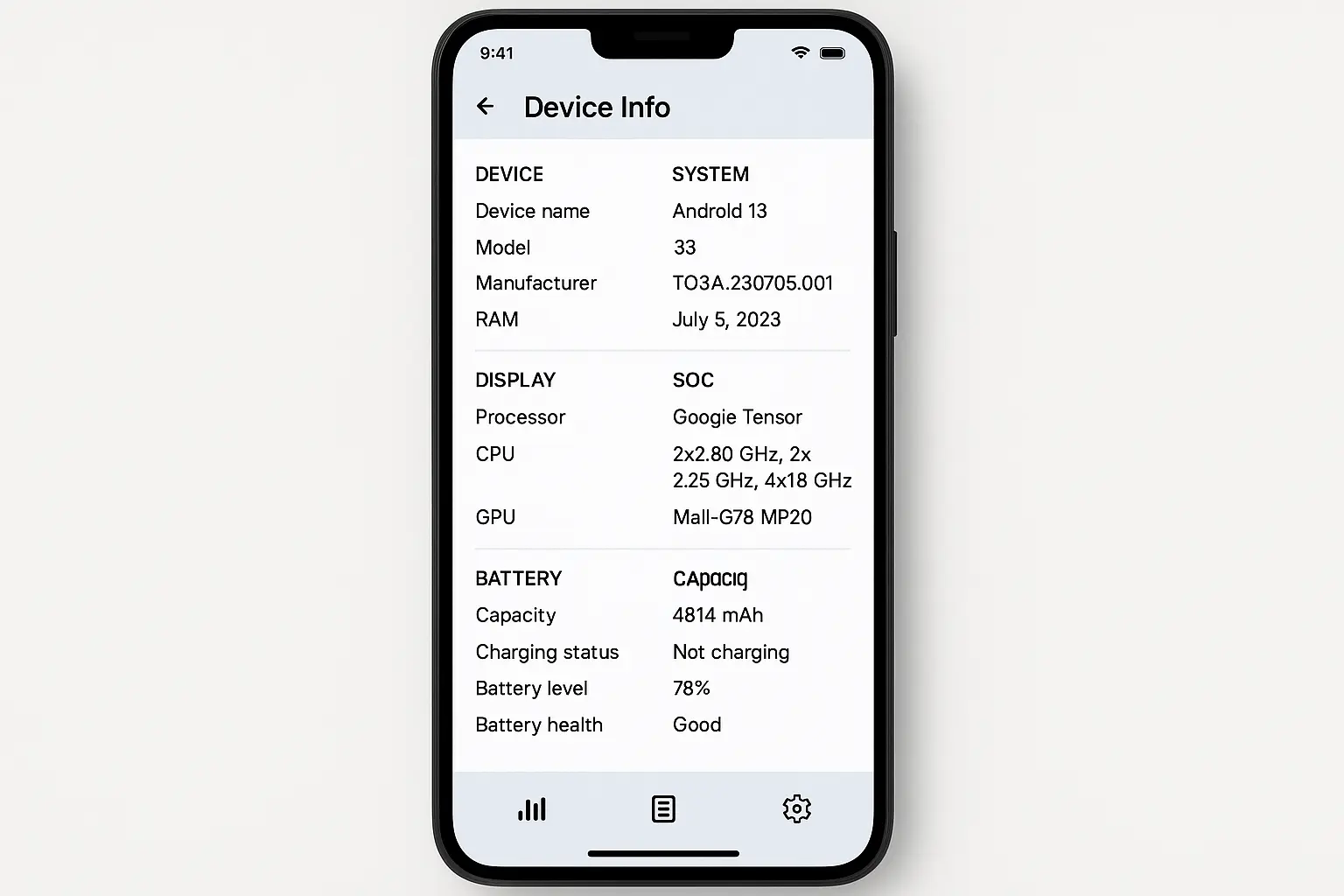
Download reputable device information apps from the Google Play Store to access comprehensive hardware details. These apps provide detailed specifications including processor information, memory configurations, and sensor details that help distinguish between similar models.
19. Google Support
When in doubt, ask the source. Contact Google Support with your serial number or IMEI, and they can tell you definitively what you've got for pixel phone model identification. Their chat support is usually pretty quick about this stuff.
Contact Google Support through official channels with your device's serial number or IMEI for definitive model identification. Google representatives have access to comprehensive device databases that provide authoritative verification.
20. Professional Assessment
Any phone repair shop worth their salt can identify your device using diagnostic tools. This is especially useful if your phone is damaged or you're buying something used and want to verify what you're getting.
Visit authorized repair shops or carrier stores for professional device identification using specialized diagnostic tools. Technicians have access to comprehensive databases and testing equipment that can identify devices even when damaged or modified.
Advanced Identification Methods
21. Storage Configuration Analysis
Storage configurations evolved across Pixel generations, with newer models offering higher base storage and different tier options. Check Settings > Storage to see your device's total capacity, then cross-reference with official specifications.
Pro models typically offer higher storage options than standard models within the same generation. If your device has 512GB or 1TB storage, you're likely holding a Pro model or newer generation device with expanded storage options.
22. Sensor and Hardware Testing
Different Pixel generations include varying sensor arrays and hardware capabilities. Test features like:
Barometer: Available on most Pixel models for altitude detection
Gyroscope sensitivity: Newer models have more precise motion detection
Ambient light sensor: Improved across generations for better auto-brightness
Proximity sensor: Location and sensitivity varies between models
23. Charging Speed Analysis
Charging capabilities evolved significantly across Pixel generations:
Pixel 1-3: Standard USB-C charging speeds
Pixel 4-5: Improved fast charging with higher wattage support
Pixel 6+: Ultra-fast charging with advanced battery management
Test your device's charging speed with a compatible fast charger to help narrow down the generation.
24. Audio and Speaker Configuration
Speaker placement and audio capabilities changed across generations:
Pixel 1-2: Traditional speaker grille designs
Pixel 3+: Improved stereo speaker systems
Pixel 6+: Enhanced audio processing with spatial audio support
Audio quality and speaker placement can provide additional identification clues when combined with other methods.
25. Battery Life and Power Management
Different Pixel generations feature varying battery capacities and power management systems:
Pixel 1-3: Smaller batteries with basic power optimization
Pixel 4-5: Improved battery life with adaptive battery features
Pixel 6+: Larger batteries with Tensor chip power efficiency
Monitor your device's battery performance and charging patterns to help identify the generation, especially when combined with other identification methods.
What Actually Works Best
Here's the reality check: software methods are your best bet if your phone turns on for google pixel identification. They're pulling info straight from the source, so there's no guesswork involved. Settings menu, IMEI lookup, Google account check - these are basically foolproof.
Software-based identification methods score highest for reliability because they access definitive database information that can't be misinterpreted. Settings menu checks, IMEI lookups, and Google account verification provide manufacturer-verified data with near-perfect accuracy.
Physical inspection is good for quick identification, but you need to know what you're looking for. The camera bar evolution is probably your most reliable visual cue - it's pretty hard to mistake that Pixel 6+ camera bar for anything else.
Physical design features and hardware capabilities offer good identification accuracy but require expertise to interpret correctly. Camera module design and fingerprint sensor location provide clear generational separation but may not distinguish between specific models within generations.
Feature testing takes more time but can narrow things down when you're stuck between similar models. Magic Eraser and Live Translate are dead giveaways for newer Pixels.
When dealing with damaged devices that need identification for repair purposes, understanding the most reliable methods becomes crucial for selecting appropriate protective solutions that prevent future identification challenges.
Identification Method |
Reliability Level |
Best Use Case |
Limitations |
|---|---|---|---|
Settings Menu |
High (95%+) |
Functional devices |
Requires working device |
IMEI Lookup |
High (95%+) |
All situations |
Need IMEI access |
Camera Design |
Medium (80%) |
Quick visual ID |
Requires expertise |
Feature Testing |
Medium (75%) |
Narrowing options |
Time-intensive |
Physical Inspection |
Low-Medium (60%) |
Backup verification |
Subjective interpretation |
Quick Troubleshooting
Phone won't turn on? IMEI lookup is your friend for pixel phone model identification. Check your carrier account, original packaging, or previous insurance/warranty paperwork.
Bought it used and suspicious? Cross-reference multiple methods. Check the IMEI against theft databases while you're at it.
Still not sure which pixel do i have? When in doubt, use multiple methods. If your settings say Pixel 6 Pro and you've got that camera bar, you're probably good to go.
Use multiple identification methods for maximum accuracy, especially when making important decisions about warranties, insurance, or resale value. Cross-reference software-based identification with physical features to ensure comprehensive verification.
Document your findings with screenshots or photos when possible. This documentation proves valuable for future reference and provides evidence for warranty claims or insurance purposes.
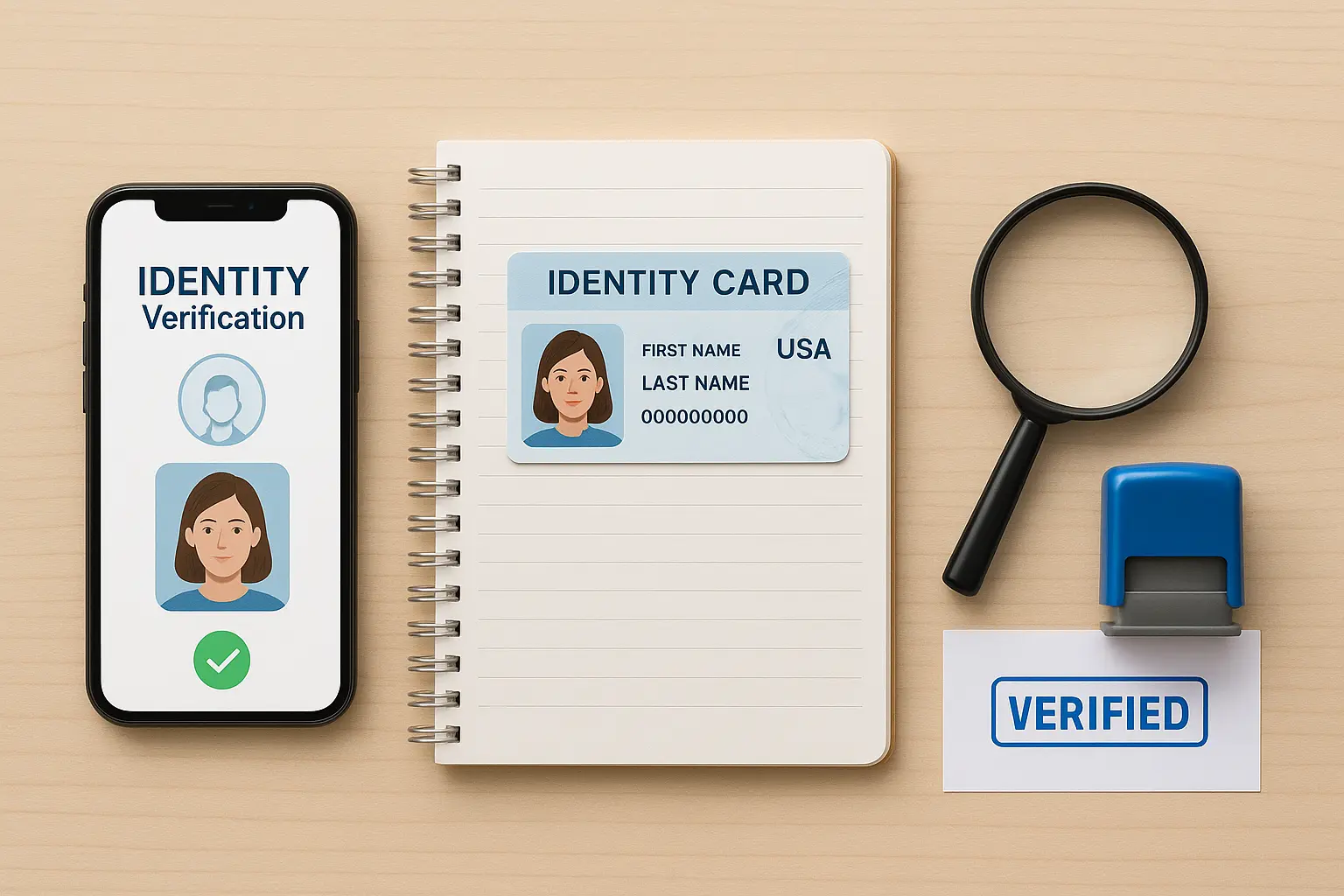
Quick Reference Guide
If You See This... |
You Probably Have... |
|---|---|
Horizontal camera bar (rectangular) |
Pixel 6, 7, or 8 |
Horizontal camera bar (oval) |
Pixel 9+ |
Round fingerprint sensor on back |
Pixel 1-5 |
Screen notch |
Pixel 3 |
Headphone jack |
Pixel 3a or 4a |
Magic Eraser in camera |
Pixel 6+ |
Face Unlock available |
Pixel 4+ |
Under-display fingerprint |
Pixel 6+ |
5G connectivity |
Pixel 4a 5G, 5, or newer |
Why This Matters for Your Wallet
Getting this right isn't just about satisfying your curiosity about which pixel do i have. The wrong identification can cost you:
Insurance claims: Try explaining to your insurance company that you "think" it was a Pixel 6
Trade-in value: Carriers and retailers need exact models for accurate quotes
Repair costs: Wrong parts orders mean delays and potentially higher costs
Accessory compatibility: Nothing worse than a case that almost fits
Resale value hinges on accurate model identification. Insurance claims, trade-in programs, and private sales all require definitive proof of your device's specifications. Misidentifying a Pixel 6 Pro as a standard Pixel 6 could cost you hundreds of dollars in trade-in value.
Rokform Protection Solutions
Understanding your exact Pixel model becomes crucial when selecting protective accessories that can withstand your active lifestyle. Rokform engineers rugged protection systems specifically designed for each device's unique dimensions, camera placements, and port configurations.
For motorcycle enthusiasts who need reliable device protection, accurate model identification ensures compatibility with specialized motorcycle phone mounts that provide secure attachment during long rides.
Each Pixel model requires precision-engineered accessories to maintain full functionality while providing maximum protection. Rokform's model-specific cases ensure your wireless charging, camera access, and port connectivity work flawlessly even during high-impact activities.
Mountain bikers need confidence that their device identification leads to properly fitted protection capable of withstanding demanding trail conditions. Rokform's rugged cases and mounting solutions keep your Pixel secure during serious off-road adventures.

For users who demand the ultimate in device protection, understanding your exact Pixel model allows you to select from the most protective phone cases available, ensuring your investment stays safe in any environment.
The Real Talk
Look, most of the time you probably know roughly what generation Pixel you have. But when it matters - insurance, repairs, selling - "roughly" doesn't cut it for proper google pixel identification. These 25 methods give you the confidence to make decisions without second-guessing yourself.
The good news? Once you figure out which pixel do i have, write it down somewhere. Stick a note in your phone case, save it in your password manager, whatever works. Future you will thank you when you're not playing this guessing game again.
The key to successful identification lies in using multiple methods for verification. Combining software-based confirmation with physical feature recognition ensures accuracy and provides documentation for important decisions about warranties, accessories, or resale value. Remember that different methods serve different purposes - choose the approaches that best fit your specific situation and needs.
And hey, now you know way more about Pixel identification than most people. You're basically a phone detective now.
Your Pixel's exact model identification opens doors to proper accessory selection, appropriate support resources, and accurate value assessment. Whether you need rugged protection for outdoor adventures or simply want to ensure compatibility with your next purchase, knowing your device's precise specifications empowers informed decisions that protect your investment and enhance your mobile experience.
By accurately identifying your Pixel model using these proven methods, you can confidently select Rokform accessories that provide the reliable protection and mounting solutions your adventures demand.

